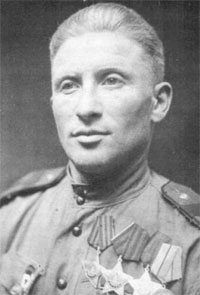Grigorii Bogorad was born in 1914 in Vitebsk, Belorussia. He only completed four years of a general education middle school, and then worked as a factory worker. In 1932, Bogorad moved to the city of Birobidzhan, where he worked as a butcher in a large food store. In 1937, he was drafted into the Red Army, with which he served at the Soviet Far East and became a skilled sapper.
With the beginning of the Soviet-German war in June 1941, Bogorad was drafted again. He was assigned to the South-Western Front that fought in Ukraine. From July 1942 until his first injury (in October 1942), he took part in the defense of Stalingrad and in the following counter-offensive. In 1943, he fought in the Kursk Salient – removing mines to allow the passage of Soviet tanks and infantry. In late 1943 and 1944, he took part in the liberation of Ukraine, then fought in Romania, and in the late 1944 and 1945 he fought in Hungary.
Bogorad's military profession was that of sapper, i.e. the clearing or placing of mines. However, in 1942 he proved himself in another specialty. Being physically strong, on a number of occasions he captured enemy soldiers to provide intelligence information for the Red Army. For example, during the defense of Stalingrad, together with two soldiers, he volunteered to go behind enemy lines and to capture informants for his division's HQ. He himself captured two enemy NCOs and took them to the HQ. Typically, the citation accompanying the presentation of Bogorad's first medal, in January 1943, did not mention how many enemies he killed, but did note that his unit had taken captive more than 50 German POWs. In February 1944, in the area of Uman (central Ukraine), Bogorad was ordered to clear mines to allow the passage of Red Army forces and to lead a Soviet group to capture enemy soldiers. First he cleared a passage through enemy lines. Then he crawled up to a German bunker, threw hand grenades into it and, with his rifle fire, facilitated the capture of a German feldwebel (first sergeant) and a rank-and-file soldier by the group he was leading. Bogorad was wounded during this operation, but continued to cover the retreat of the group back to Soviet positions.
Bogorad was awarded Orders of Glory of all three classes (3rd class and 2nd class – in 1944, and 1st class – in Hungary, in 1945), the medal "For the Defense of Stalingrad," and other medals. Surprisingly, his highest rank until the end of the war was senior sergeant (Only on May 1, 1945 was he promoted to the rank of company sergeant-major) and his highest position, that of deputy commander of a platoon.
An article on the sapper Bogorad was published in the Soviet Yiddish newspaper Eynikayt in February 1946. Another article about him appeared in the monthly Sovetish Heymland in 1970.
After the war, Bogorad returned to Birobidzhan. He worked as a stoker at a furniture factory, then in a food store. In 1976, he left Birobidzhan for Ukraine. Finally, Bogorad moved to Israel. He lived in Migdal ha-Emek, where he died in 1996.







